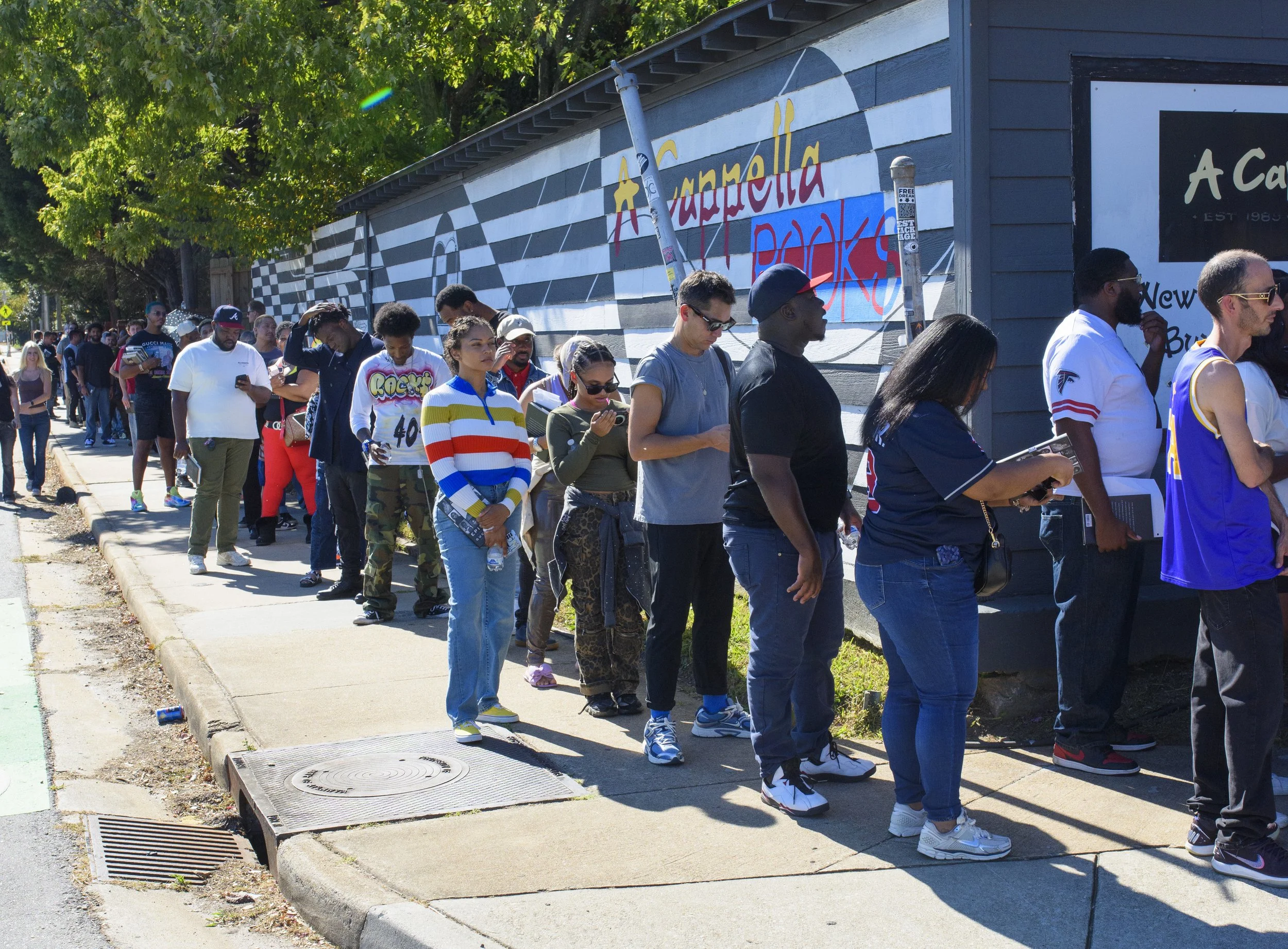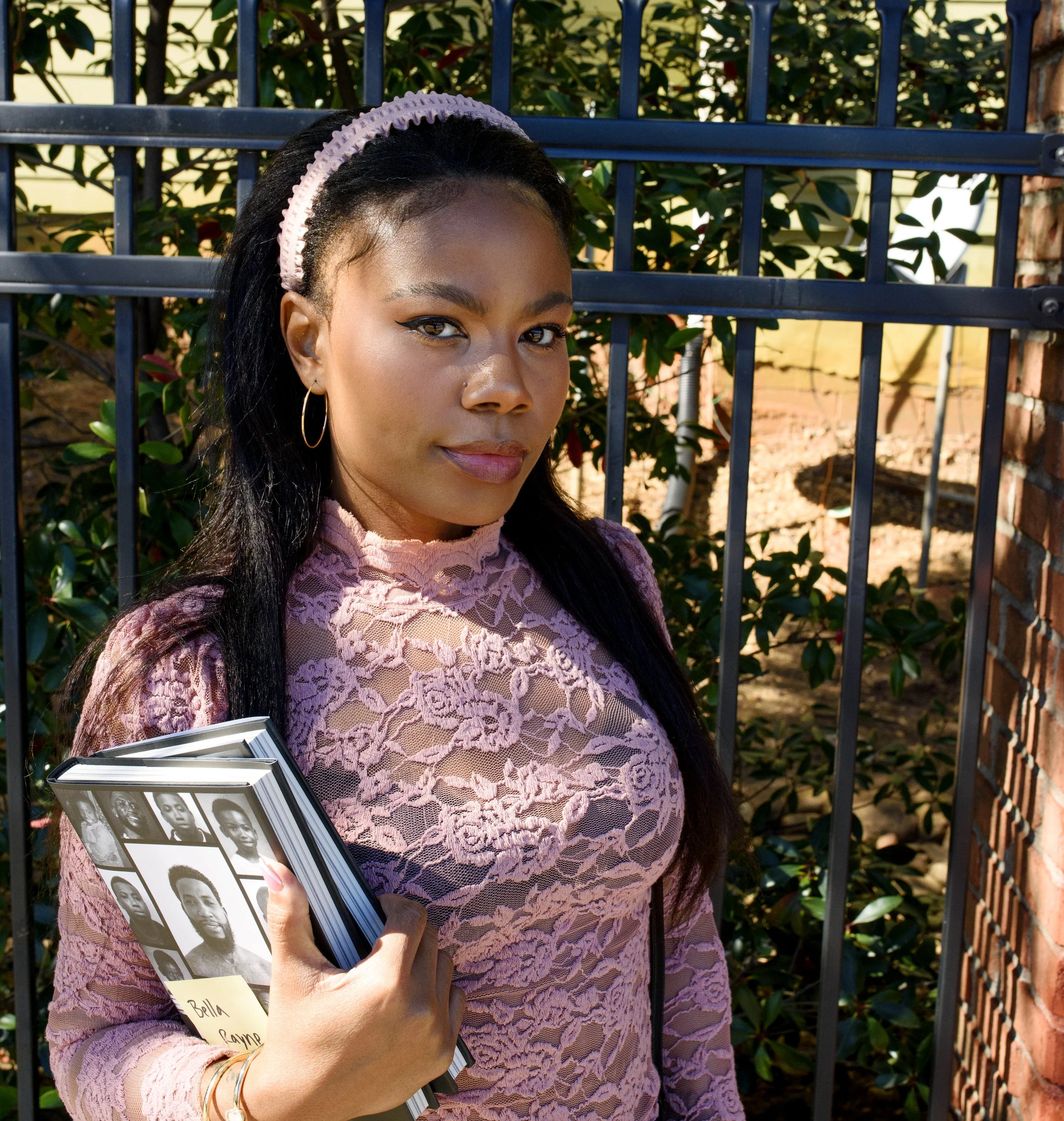Gucci Mane’s New Chapter: From Trap King to “Mad Man” Author
Atlanta, GA — I knew this was more than a typical book signing the moment I saw the crowd. The line snaked around the block outside A Cappella Books in Atlanta, with fans of all ages braving the Georgia sun for a chance to meet Gucci Mane. Teens in fresh 1017 Records tees waited alongside a retired school teacher clutching her first-edition copy. One father even stood patiently with his infant snoozing in a carrier on his chest, determined to have Gucci sign a book for the collection. The atmosphere was electric – a mix of literary excitement and hometown pride – as Gucci Mane, one of hip-hop’s most iconic figures, prepared to celebrate his new memoir “Episodes: The Diary of a Recovering Mad Man.”
The line outside of Atlanta’s Acappella Books waiting for the Gucci Mane Pre-Release and signing of “Episodes: The Diary of a Recovering Mad Man”
Bella Rayne and I arrived representing Blerdz, our community for Black nerds and creatives, eager to witness this homecoming. Inside the cozy Rare Books section, Gucci Mane sat comfortably behind a showcase. He greeted each fan with a warm smile, pausing to engage in brief conversations and pose for quick photos – despite official guidelines saying photos only from the line, Gucci couldn’t resist making each moment special. When our turn came, I felt my heart race with excitement, thanking him for coming out. Bella told Gucci Mane about Blerdz – our vision of a space for Black nerds and creatives to thrive. His eyes lit up. “Blerdz? I love that. Like, nerds but black, that’s real dope,” he said with an approving grin, nodding at the concept and name. In that instant, my worlds of fandom and purpose collided, and Gucci’s genuine enthusiasm for our mission felt as meaningful as the autograph he scribbled in my book and the quick he took with us.
A Homecoming at A Cappella Books
This wasn’t just a celebrity promo stop; it felt like a homecoming. A Cappella Books is an Atlanta institution, and Gucci Mane – born Radric Delantic Davis – is an Atlanta icon who helped put the city’s trap music on the map. Seeing him back here, not to perform on stage, but to meet readers as a New York Times bestselling author, was surreal. The store’s intimate setting was a far cry from the arenas and clubs where Gucci’s music usually shakes the walls. Instead of booming 808s, the room was filled with the hushed excitement of fans who’d followed his journey from the streets to superstardom.
As I walked the line I observed the diversity of his supporters. A college student gushed about how Gucci’s mixtapes got him through tough times. A flamboyantly dressed older lady reminded me of my grandmother as she clutched her copy of “Episodes” in anticipation. Each face in the crowd showed a different “episode” of how Gucci Mane has touched people’s lives. And Gucci, dressed in casual designer streetwear and flashing his famous smile, greeted each person like family. It was a celebration – not just of a new book, but of how far Atlanta’s son has come.
From Trap House to Publishing House
Many of us in line couldn’t help but reflect on Gucci Mane’s incredible evolution. He’s revered as a pioneer of trap music, coming up in the mid-2000s with raw lyricism that chronicled Atlanta street life. Back in 2005, Gucci’s debut album Trap House dropped gritty hits like “Icy,” cementing his status in Southern hip-hop. Over the years, he churned out a prolific string of mixtapes and albums, collaborating with and even launching the careers of other stars. It’s no exaggeration to say Gucci helped birth a movement – he co-founded the trap subgenre alongside producer Zaytoven and mentored artists like Waka Flocka Flame, Young Thug, Migos, and more through his 1017 Records label.
But with the fame came turmoil. Gucci Mane’s rise was intertwined with well-documented legal troubles and personal demons. In the late 2000s and early 2010s, headlines often highlighted his run-ins with the law: assault charges, weapons charges, probation violations – a chaotic spiral that played out in public. By 2013, things hit a low point as Gucci’s addiction to lean and other substances fueled erratic behavior. He ultimately landed in federal prison in 2014 on a firearms charge, facing the very real possibility that his career – or even his life – might end behind bars.
Then came the turning point. “I had time to sit back and evaluate everything, and also dry out from the drugs,” Gucci later reflected about his time incarcerated. “I didn’t want to live my life in prison… So I was like, one thing I need to do is be totally sober. I need to have complete clarity, razor-sharp focus on everything I do” hotaugusta.com. In prison, Gucci Mane underwent a remarkable physical and mental transformation. He kicked his drug habit, started exercising obsessively, and shed nearly 90 pounds. When he walked out of federal prison on May 26, 2016, fans were stunned by the new Gucci – slim, healthy, clear-eyed – a far cry from the wild persona that once coined himself “Gucci the Mad Man.”
Within hours of release, Gucci was back to making music – recording the triumphant track “First Day Out Tha Feds.” He embraced a productive routine, and for the first time in his career, sobriety. Gucci’s comeback album Everybody Looking (recorded in just six days after his release) went platinum, and suddenly the industry was witnessing one of hip-hop’s greatest redemption stories. That same year, the luxury fashion house Gucci (his namesake) even featured him in a global campaign – an unimaginable cosign back in his darker days. Gucci Mane was not just back; he was better.
Gucci Mane’s “Episodes: The Diary of a Recovering Mad Man” audio book available on Apple 10/17/2025
Trials, Triumphs, and “Episodes” of Growth
Fast-forward to 2025, and Gucci Mane has channeled all those experiences into the pages of “Episodes: The Diary of a Recovering Mad Man.” Co-authored with music journalist Kathy Iandoli, this new memoir isn’t just a victory lap – it’s a raw, unflinching look at the mental health struggles and hard lessons behind Gucci’s legendary hustle. As Bella and I waited in line we couldn’t help but read through the first few pages, a task which nearly brought Bella to tears. In Episodes Gucci dives right in to chronicling his mental health struggles, and as sommeone with mental health struggles of her own, Bella was moved by the vulnerability. In Episodes, Gucci revisits the flashpoints of his life – the literal “episodes” fans might know from tabloid headlines or lyrics – and reveals what he was really going through at the time, psychologically and emotionally.
This is what is perhaps most powerful, how Episodes positions Gucci Mane as an unlikely advocate for mental health awareness in the community. Hip-hop doesn’t often talk openly about anxiety, depression, or addiction, especially not from a street-raised, “hard” rapper perspective. Gucci aims to change that. Episodes is his way of saying that it’s okay to talk about these issues out loud – to go beyond the old “keep it inside” approach many families and entertainers have traditionally taken. By connecting his experiences to larger lessons, Gucci is trying to destigmatize conversations around mental illness among his fans. “Each one, teach one,” he writes, isn’t enough when it comes to healing trauma; we need a culture that openly supports recovery and growth.
Blerdz.net own Bella Rayne (@iambellarayne) waiting to enter the signing event while holding her copies of Gucci Mane’s “Episodes: The Diary of a Recovering Mad Man”.
As I flipped through my signed copy later, I was struck by how compelling the narrative is. The book reads like sitting in on a late-night studio session with Gucci, where he’s finally telling the full story behind the headlines. It’s both memoir and message: a cautionary tale with a hopeful turn, urging readers that if he – Mr. Zone 6, the Trap God – could confront his inner demons, maybe they can too. Gucci’s willingness to expose his vulnerabilities is itself a triumph, showing that even a rap icon known for ice-cold bravado can have the courage to seek help and change.
It’s worth remembering that this isn’t Gucci Mane’s first literary endeavor. His debut autobiography (released in 2017 shortly after his prison release) became a New York Times bestseller, and he followed up with a book of life advice (The Gucci Mane Guide to Greatness in 2020). But Episodes feels different. It’s more personal, more introspective. At 176 pages, it’s a brisk read – but every chapter packs a punch. You get the sense that writing these diaries was as therapeutic for Gucci as it will be illuminating for his readers. After all, this is a man who has released 15 studio albums and over a hundred mixtapes/projects in his caree – storytelling is second nature to him. Now he’s using that gift to shine a light on the importance of mental well-being and redemption.
Love, Family, and the Second Act of Gucci Mane
No story of Gucci Mane’s transformation would be complete without talking about family. As much as Gucci’s professional life was reborn post-2016, so was his personal life. In October 2017, just a year after regaining his freedom, Gucci married his longtime girlfriend Keyshia Ka’oir in a star-studded ceremony televised on BET. Keyshia, a successful entrepreneur in her own right, had been a rock for Gucci – she famously stuck by his side during his time in prison and house arrest, helping him stay focused on the future. Their wedding, a $1.7 million Miami extravaganza, was a symbolic capstone to Gucci’s rebirth: the onetime “So Icy” wild man settling down into devoted husbandhood. In Gucci’s words, Keyshia had loved the man he was and the man he was trying to become, and together they’ve built a new life.
The Blerdz.net permeant office copy of Gucci Man’s “Episodes: The Diary of a Recovering Mad Man”
Today, Gucci Mane is a proud father as well, doting on a young son (Ice Davis, born 2020) with Keyshia, in addition to an older son from a previous relationship. Fatherhood seems to have softened the trap star in all the right ways. He often shares on social media how much joy his kids bring him, a far cry from the days when his Twitter feed was more likely to spark feuds than celebrate family. There’s a poignant section in Episodes where Gucci reflects on breaking cycles of trauma for the next generation. You get the sense that becoming a dad has only strengthened his resolve to stay on a positive path.
Gucci Mane’s story is far from over, but this chapter – documented in a diary of a recovering mad man – is one for the books. As I thumb through the first pages of Episodes later that night, I’m struck by a simple thought. Gucci’s greatest flex isn’t the cars, the ice, or even the music. It’s his growth. It’s the fact that he survived himself and came out the other side smarter, healthier, and determined to help others do the same. In a world hungry for genuine comeback stories, Gucci Mane just gave us one – and it’s a page-turner.








